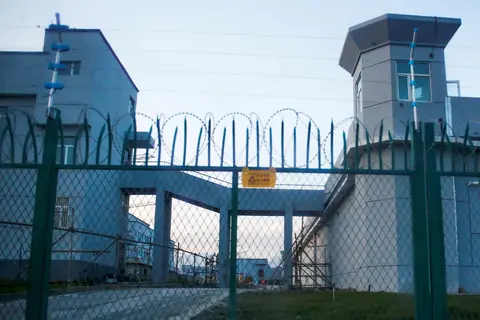
This letter features reporting from “What They Saw: Ex-Prisoners Detail the Horrors of China's Detention Camps” by Alison Killing and Megha Rajagopalan
Dear Senator Klobuchar,
I’m Mia Wolfe. I am a sixth grade student at Heilicher Minneapolis Jewish Day School in Minneapolis, Minnesota. I am writing to you because I feel like almost nothing is being said about the detention camps in China. I feel like this is a very big topic that we all know so little on. We need to learn more about this before it is too late to do anything.
I found an article about this horrible situation that really stood out to me from the Pulitzer Center. It's titled “What They Saw: Ex-Prisoners Detail the Horrors of China's Detention Camps” by Alison Killing and Megha Rajagopalan. This article mostly follows a woman named Nursaule and her story of when she was brought to these detention camps. Most people brought to these places were Uighur or Kazakh, and brought for the most unreasonable things—like looking suspicious or having a banned app. These camps were supposed to give educational training to Muslim minorities but it’s the exact opposite, having them behind big walls and barbed wire. When—or if—you are ever released, you have to sign an agreement form to never speak about the detention camps ever again, so most people who got interviewed were terrified that something would happen to them after they told their story.
When they got to the detention camps they would get “medical check-ups,” taking blood samples, urine samples, etc. They also give you color-coded clothes based on how much of a threat you are. Everyone has to change into their new clothes in one room, surrounded by other people. Other women also had to cut their long hair all the way to their chin. “I wanted to keep my hair,” said Nursaule. “Keeping long hair, for a Kazakh woman, is very important. I had grown it since I was a little girl, I had never cut it in my life. Hair is the beauty of a woman. I couldn’t believe it...They wanted to hack it off.” There is absolutely no privacy, too. There are at least two security cameras in every single room, even the bathrooms. The bedrooms have stacked bunk beds and a tiny plastic stool for each person. Some camps are also terribly crowded with two people sleeping in a twin bed. If anyone acted up they were usually beaten or put in solitary confinement. Nursaule never got beaten but she was arguing with someone in her dorm and got taken to a dark room. The article states, “There, it was dark, with only a metal chair and a bucket. Her ankles were shackled together. The room was small, about 10 feet by 10 feet, she said, with a cement floor. There was no window. The lights were kept off, so guards used a flashlight to find her.” After three days she went back to her dorm. Everyone was forced to learn Chinese. Even if there were too many people to fit in a classroom, they would have to learn the language in their dorms, sitting on their plastic stools. But, for those who had to sit in classrooms, the teacher would be behind a transparent wall or a set of bars.
Almost everyone who was interviewed said they were always moving from camp to camp, and no one was given a reason for these moves. The article states, “Among them was Dina Nurdybai, a 27-year-old Kazakh woman who ran a successful clothing manufacturing business. After being first detained on October 14, 2017, Nurdybai was moved between five different camps — ranging from a compound in a village where horses were raised to a high-security prison. In the first camp, 'it seemed like 50 new people were coming in every night. You could hear the shackles on their legs,' she said.” When Dina was released, she was told that she was detained because she had an illegal software app—Whatsapp.
This situation is horrible globally, too. People could wake up not knowing where their friends or family are and never know for the rest of their life. They would live with regret their whole life, wishing their last word with them was something else, or that they talked to them more before they would never see them again. But, if their friends or family do come back, they won't be able to tell them where they were for all those years because they are terrified that they will get taken back even if they say a single word. It’s almost like we are having something like the Holocaust all over again. As an American Jew, this is really horrifying to see.
In the U.S., we are also getting a lack of information from prisons. In an article I read, “How Prison Officials Block Access to the Media” by Karina Piser and Marcia Brown, a reporter in Arizona can get almost no information of what's happening due to the new COVID-19 restrictions for interviews. No prisoners are even allowed to talk by call to reporters. The only way is by mail. This means that lots of things that we could never know about could be happening in prisons all over the U.S., like the other side of COVID-19 in prisons. Social distancing in prisons right now is a fantasy. According to The Marshall Project, at least 102,494 people have tested positive for COVID-19 since August 18. We could have made some big changes to this problem months ago if prisons didn’t wait until the last minute.
Unfortunately, there isn’t a lot we can do about this situation in China. At least, nothing I can do. But, there is something we can do about this prison problem in the U.S. My proposal is that we give reporters more options and information when it comes to interviewing people who are incarcerated, like at least letting reporters talk on the phone to get a feeling of what their mood is by hearing the tone of their voice. I would like to do this because I think it is very important for everyone to have a voice, and I feel like people who are in prison don't really get one.
Thank you very much for reading this. I really hope you consider my idea. It would even give me the slightest bit of joy if you established this at just one prison.
Sincerely,
Mia Wolfe

Mia Wolfe is currently in 6th grade at Heilicher Minneapolis Jewish Day School. In her free time, Mia loves playing tennis, experimenting with different cooking recipes, and painting. She lives with her mom, dad, sister, and two crazy dogs.
Read more winning entries from the 2020 Local Letters for Global Change contest!